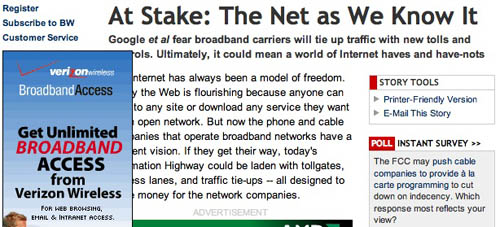A couple of interesting items:
Larry Lessig wrote an excellent post last week debunking certain myths circulating the “to regulate or not to regulate” debate in Washington, namely that introducing “net neutrality” provisions in the new Telecom bill would impose unprecedented “common carriage” regulation on network infrastructure. Of course, the infrastructure was regulated before — when the net was accessed primarily through phone lines. Lessig asks: if an unregulated market is so good for the consumer, then why is broadband service in this country so slow and so expensive?
Also worth noting is a rough sketch from internet entrepreneur Mark Cuban of the idea of “tiered” network service. This would entail prioritizing certain uses of bandwidth. For example, your grandma’s web-delivered medical diagnostics would be prioritized over the teenager downloading music videos next door (if, that is, someone shells out for the priority service). This envisions for the consumer end what cable and telephone execs have dreamed of on the client end — i.e. charging certain web services more for faster page loads and speedier content delivery. Seems to me that either scenario would make the U.S. internet more like the U.S. healthcare system: abysmal except for those with cash.
Category Archives: Network_Freedom
who owns the network?
Susan Crawford recently floated the idea of the internet network (see comments 1 and 2) as a public trust that, like America’s national parks or seashore, requires the protection of the state against the undue influence of private interests.
…it’s fine to build special services and make them available online. But broadband access companies that cover the waterfront (literally — are interfering with our navigation online) should be confronted with the power of the state to protect entry into this self-owned commons, the internet. And the state may not abdicate its duty to take on this battle.
Others argue that a strong government hand will create as many problems as it fixes, and that only true competition between private, municipal and grassroots parties — across not just broadband, but multiple platforms like wireless mesh networks and satellite — can guarantee a free net open to corporations and individuals in equal measure.
Discussing this around the table today, Ray raised the important issue of open content: freely available knowledge resources like textbooks, reference works, scholarly journals, media databases and archives. What are the implications of having these resources reside on a network that increasingly is subject to control by phone and cable companies — companies that would like to transform the net from a many-to-many public square into a few-to-many entertainment distribution system? How open is the content when the network is in danger of becoming distinctly less open?
the net as we know it
There’s a good article in Business Week describing the threat posed by unregulated phone and cable companies to the freedom and neutrality of the internet. The net we know now favors top-down and bottom-up publishing equally. Yahoo! or The New York Times may have more technical resources at their disposal than your average blogger, but in the pipes that run in and out of your home connecting you to the net, they are equals.
That could change, however. Unless government gets pro-active on the behalf of ordinary users, broadband providers will be free to privilege certain kinds of use and certain kinds of users, creating the conditions for a broadcast-oriented web and charging higher premiums for more independently creative uses of bandwidth.
Here’s how it might work:
So the network operators figure they can charge at the source of the traffic — and they’re turning to technology for help. Sandvine and other companies, including Cisco Systems, are making tools that can identify whether users are sending video, e-mail, or phone calls. This gear could give network operators the ability to speed up or slow down certain uses.
That capability could be used to help Internet surfers. BellSouth, for one, wants to guarantee that an Internet-TV viewer doesn’t experience annoying millisecond delays during the Super Bowl because his teenage daughter is downloading music files in another room.
But express lanes for certain bits could give network providers a chance to shunt other services into the slow lane, unless they pay up. A phone company could tell Google or another independent Web service that it must pay extra to ensure speedy, reliable service.
One commenter suggests a rather unsavory scheme:
The best solution is to have ISPs change monthly billing to mirror cell phone bills: X amount of monthly bandwidth any overage customer would be charged accordingly. File sharing could become legit, as monies from our monthly bills could be funneled to the apprioprate copyright holder (big media to regular Joe making music in his room) and the network operators will be making more dough on their investment. With the Skypes of the world I can’t see this not happenning!

It seems appropriate that when I initially tried to read this article, a glitchy web ad was blocking part of the text — an ad for broadband access no less. Bastards.
insidious tactic #348: charge for web speed
An article in yesterday’s Washington Post — “Executive Wants to Charge for Web Speed” — brings us back to the question of pipes and the future of the internet.  The chief technology officer for Bell South says telecoms and cable companies ought to be allowed to offer priority deals to individual sites, charging them extra for faster connections. The Post:
The chief technology officer for Bell South says telecoms and cable companies ought to be allowed to offer priority deals to individual sites, charging them extra for faster connections. The Post:
Several big technology firms and public interest groups say that approach would enshrine Internet access providers as online toll booths, favoring certain content and shutting out small companies trying to compete with their offerings.
Among these “big technology firms” are Google, Yahoo!, Amazon and eBay, all of whom have pressed the FCC for strong “network neutrality” provisions in the latest round of updates to the 1996 Telecommunications Act. These would forbid discrimination by internet providers against certain kinds of content and services (i.e. the little guys). BellSouth claims to support the provisions, though the statements of its tech officer suggest otherwise.
Turning speed into a bargaining chip will undoubtedly privilege the richer, more powerful companies and stifle competition — hardly a net-neutral scenario. They claim it’s no different from an airline offering business class — it doesn’t prevent folks from riding coach and reaching their destination. But we all know how cramped and awful coach is. The truth is that the service providers discriminate against everyone on the web. We’re all just freeloaders leeching off their pipes. The only thing that separates Google from the lady blogging about her cat is how much money they can potentially pay for pipe rental. That’s where the “priorities” come in.
Moreover, the web is on its way to merging with cable television, and this, in turn, will increase the demand for faster connections that can handle heavy traffic. So “priority” status with the broadband providers will come at an ever increasing premium. That’s their ideal business model, allowing them to charge the highest tolls for the use of their infrastructure. That’s why the telecos and cablecos want to ensure, through speed-baiting and other screw-tightening tactics, that the net transforms from a messy democratic commons into a streamlined broadcast medium. Alternative media, video blogging, local video artists? These will not be “priorities” in the new internet. Maximum profit for pipe-holders will mean minimum diversity and a one-way web for us.
In a Business Week interview last month, SBC Telecommunications CEO Edward Whitacre expressed what seemed almost like a lust for revenge. Asked, “How concerned are you about Internet upstarts like Google, MSN, Vonage, and others?” he replied:
How do you think they’re going to get to customers? Through a broadband pipe. Cable companies have them. We have them. Now what they would like to do is use my pipes free, but I ain’t going to let them do that because we have spent this capital and we have to have a return on it. So there’s going to have to be some mechanism for these people who use these pipes to pay for the portion they’re using. Why should they be allowed to use my pipes?
The Internet can’t be free in that sense, because we and the cable companies have made an investment and for a Google or Yahoo! or Vonage or anybody to expect to use these pipes [for] free is nuts!
This makes me worry that discussions about “network neutrality” overlook a more fundamental problem: lack of competition. “That’s the voice of someone who doesn’t think he has any competitors,” says Susan Crawford, a cyberlaw and intellectual property professor at Cardozo Law School who blogs eloquently on these issues. She believes the strategy to promote network neutrality will ultimately fail because it accepts a status quo in which a handful of broadband monopolies dominate the market. “We need to find higher ground,” she says.
I think the real fight should be over rights of way and platform competition. There’s a clear lack of competition in the last mile — that’s where choice has to exist, and it doesn’t now. Even the FCC’s own figures reveal that cable modem and DSL providers are responsible for 98% of broadband access in the U.S., and two doesn’t make a pool. If the FCC is getting in the way of cross-platform competition, we need to fix that. In a sense, we need to look down — at the relationship between the provider and the customer — rather than up at the relationship between the provider and the bits it agrees to carry or block…
…Competition in the market for pipes has to be the issue to focus on, not the neutrality of those pipes once they have been installed. We’ll always lose when our argument sounds like asking a regulator to shape the business model of particular companies.
The broadband monopolies have their priorities figured out. Do we?
image: “explosion” (reminded me of fiber optic cable) by The Baboon, via Flickr
grant virtual asylum – adopt a chinese blog
People sometimes wonder what would have happened if the Soviet Union had survived long enough to experience the internet. It’s a delicious “what if” scenario to contemplate. The USSR was quite skilled at using broadcast and print media to achieve total message discipline (the Bush administration can only dream), but what would have happened if a totally decentralized medium like the web (a control freak’s nightmare) sprung up right under the Kremlin’s boots? Would the dissidents have bubbled over into cyberspace in a surging tide too powerful to control? Or would the the government have cracked down brutally, or cut off the emerging technology before it could develop, drawing the iron curtain still further over the information commons? Someone should write a novel (á la Thomas Harris, Philip Roth)..
But look to China today, and we can get at least some idea of what might have happened. Granted, China is now a booming frontier of global capitalism, having all but abandoned the communist economic model. But the regime is still quite Soviet in its attitudes toward the media (which it totally controls) and toward expressions of political dissent (which it forbids and punishes). The internet presents a particularly devilish challenge.
 In response, the government has set up a “Great Firewall” blocking off certain sections of the web (anything from Google News to Human Rights Watch) that it would rather its citizens didn’t see. Not wanting to get shut out of the world’s biggest emerging market, American corporations like Yahoo, Google, and most recently Microsoft, have complied with state demands that certain services, and even certain terms like “democracy,” “freedom” or “human rights,” are blocked in Chinese versions of their web applications. In addition, the government recently passed legislation requiring all websites to be registered. Anything deemed inappropriate gets taken off its server. A hundred flowers may bloom on the internet, but not if the government cuts them off at the root.
In response, the government has set up a “Great Firewall” blocking off certain sections of the web (anything from Google News to Human Rights Watch) that it would rather its citizens didn’t see. Not wanting to get shut out of the world’s biggest emerging market, American corporations like Yahoo, Google, and most recently Microsoft, have complied with state demands that certain services, and even certain terms like “democracy,” “freedom” or “human rights,” are blocked in Chinese versions of their web applications. In addition, the government recently passed legislation requiring all websites to be registered. Anything deemed inappropriate gets taken off its server. A hundred flowers may bloom on the internet, but not if the government cuts them off at the root.
It’s estimated there are about 1 million Chinese blogs, and that number is sure to increase ten, twenty a hundred fold. Who knows? If it gets to that point, the government probably won’t be able to keep up. But for now, bloggers with even slightly controversial politics are in danger of getting shut down. This is why some Chinese bloggers are moving their sites abroad, seeking political haven on western servers. Isaac Mao, a venture capitalist in Shanghai for internet startups, self-professed “meta idea” generator, and one of the first Chinese bloggers, has set up an “adopt-a-blog” program that matches up fellow bloggers with foreigners willing to make a little extra room on their servers. It’s a great idea, and a chance for the blogosphere to come together as a global community.
Additional links:
More about Isaac Mao in Wired: “Chinese Blogger Slams Microsoft”
Someone found a way to circumvent Microsoft’s block on “freedom,” “democracy” etc.: “Loophole lets ‘Freedom’ ring in Chinese MSN blogs” (with complete instructions here)
